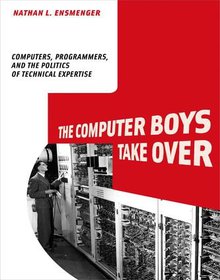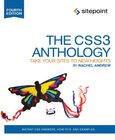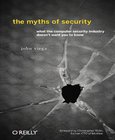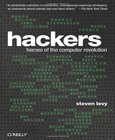The Computer Boys Take Over
Computers, Programmers and the Politics of Technical Expertise

Book Details:
| Publisher: | The MIT Press |
| Series: | MIT Press , Expert |
| Author: | Nathan Ensmenger |
| Edition: | 1 |
| ISBN-10: | 0262050935 |
| ISBN-13: | 9780262050937 |
| Pages: | 336 |
| Published: | Aug 13 2010 |
| Posted: | Dec 23 2014 |
| Language: | English |
| Book format: | |
| Book size: | 13.19 MB |
Book Description:
This is a book about the computer revolution of the mid-20th century and the people who made it possible. Unlike most histories of computing, it is not a book about machines, inventors, or entrepreneurs. Instead, it tells the story of the vast but largely anonymous legions of computer specialists-programmers, systems analysts, and other software developers-who transformed the electronic computer from a scientific curiosity into the defining technology of the modern era. Known alternatively as whiz kids, hackers, and gurus, this new breed of technical specialists were alternately admired for their technical prowess and despised for their eccentric mannerisms and the disruptive potential of the technologies they developed. As the systems that they built became evermore powerful and ubiquitous, these specialists became the focus of a series of critiques of the social and organizational impact of electronic computing. To many of their contemporaries, it seemed the computer boys were taking over, not just in the corporate setting, but also in government, politics, and society in general. In The Computer Boys Take Over, Nathan Ensmenger traces the rise to power of the computer expert in modern American society. He follows the history of computer programming from its origins as low-status, largely feminized labor in the secret wartime computing projects through its reinvention as a glamorous black art practiced by computer cowboys in the 1950s through its rationalization in the 1960s as the academic discipline of computer science and the software engineering profession. His rich and nuanced portrayal of the men and women (a surprising number of the computer boys were, in fact, female) who built their careers around the novel technology of electronic computing explores issues of power, identity, and expertise that have only become more significant to our increasingly computerized society. His detailed analysis of the pervasive software crisis rhetoric of the late 1960s shows how seemingly technical debates about how to manage large-scale software development projects reflected deeper concerns about the growing power and influence of technical specialists in corporate, academic, and governmental organizations. In his recasting of the drama of the computer revolution through the eyes of its principle revolutionaries, Ensmenger reminds us that the computerization of modern society was not an inevitable process driven by impersonal technological or economic imperatives, but was rather a creative, contentious, and above all, fundamentally human development.
Download Link:
Related Books:
The CSS3 Anthology
Take Your Sites to New Heights
4th Edition
The CSS3 Anthology: 101 Essential Tips, Tricks Hacks is a compilation of best-practice solutions to the most challenging CSS problems. The fourth edition of this best-selling full-color book has been completely revised and updated to cover newer techniques enabled by CSS3 and HTML5, and more recent trends in web design, such as responsive design. It's the most complete question-and-answer book on CSS available, with over 100 tutorials that show readers how to gain more control over the appearance of their web pages, create sophisticated web page navigation controls, and design for alternative browsing devices, including phones and screen readers. The...
The Myths of Security
What the Computer Security Industry Doesn't Want You to Know
If you think computer security has improved in recent years, The Myths of Security will shake you out of your complacency. Longtime security professional John Viega, formerly Chief Security Architect at McAfee, reports on the sorry state of the industry, and offers concrete suggestions for professionals and individuals confronting the issue. Why is security so bad? With many more people online than just a few years ago, there are more attackers -- and they're truly motivated. Attacks are sophisticated, subtle, and harder to detect than ever. But, as Viega notes, few people take the time to understand the situation and protect themselves accordingly. This book tells you:Why it's easier for bad guys to "own" your computer than you think Why a...
Hackers
Heroes of the Computer Revolution - 25th Anniversary Edition
This 25th anniversary edition of Steven Levy's classic book traces the exploits of the computer revolution's original hackers -- those brilliant and eccentric nerds from the late 1950s through the early '80s who took risks, bent the rules, and pushed the world in a radical new direction. With updated material from noteworthy hackers such as Bill Gates, Mark Zukerberg, Richard Stallman, and Steve Wozniak, Hackers is a fascinating story that begins in early computer research labs and leads to the first home computers. Levy profiles the imaginative brainiacs who found clever and unorthodox solutions to computer engineering problems. They had a shared sense of values, known as "the hacker ethic," that still thrives today. Hackers captures a se...
2007 - 2021 © eBooks-IT.org



